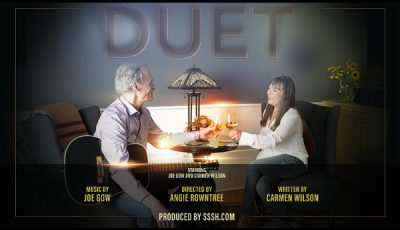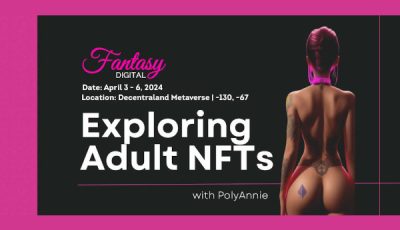Despite Regulatory Uncertainty, NFTs Popping Up All Over Adult Industry
 LAS VEGAS — Adult industry news organizations lit up when legendary Welsh adult actress Sophie Dee announced that she has minted the “Virtual Girlfriend Token” (VGT) as her inaugural entry into the ever growingly popular NFT marketplace and blockchain product innovation. Dee’s token is one of the latest examples of the adult entertainment industry adopting NFT technology. OnlyFans.com models such as Siri Dahl and Allie Eve Knox have taken up NFT sales. And, the studio Wasteland is releasing the cult horror-porn classic Succubus attached with an NFT that features never-before seen extra footage and one-of-a-kind digital collectibles.
LAS VEGAS — Adult industry news organizations lit up when legendary Welsh adult actress Sophie Dee announced that she has minted the “Virtual Girlfriend Token” (VGT) as her inaugural entry into the ever growingly popular NFT marketplace and blockchain product innovation. Dee’s token is one of the latest examples of the adult entertainment industry adopting NFT technology. OnlyFans.com models such as Siri Dahl and Allie Eve Knox have taken up NFT sales. And, the studio Wasteland is releasing the cult horror-porn classic Succubus attached with an NFT that features never-before seen extra footage and one-of-a-kind digital collectibles.
An NFT, or a non-fungible token, is a virtual unit on a digital ledger (a blockchain) where it represents a unique digital unit and cannot be interchanged. NFTs, by this definition, represent digital files like art, audio, video, and other forms of creative works uniquely attached to an NFT. Often, these tokens are auctioned off to the highest bidder who pays out with a cryptocurrency like ethereum. The marriage of blockchain and the porn industry has the potential to be a huge business. NFTs, as a new kind of ‘digital collectible,’ could serve as the next generation for distributing media like a virtual Pokémon card, a rare comic book or a traditional artwork, painting, a photo, video, and or audio.
For example, Twitter chief executive officer Jack Dorsey announced that he put up his very first tweet for sale as an NFT at $2.5 million. Dorsey’s very first tweet was only 24 characters — “just setting up my twttr.” Based on that calculation, 24 characters — including the spaces — places each character at over $100,000 per character. The tweet, posted by Dorsey in 2006, is so valuable because it essentially serves as a digital ‘landmark’ with his signature and a few lines of basic code.
Tom C.W. Lin, a professor at the Beasley School of Law at Temple University told Business Insider that an NFT shares the function of something like a security or unique sort of investment. These sorts of assets aren’t securities. Despite being traded as an auction item, the NFT is unique as we’ve described. Lin explains that “an NFTs value is largely derived as a function of scarcity and speculation.”
This means that the rarity of the digital collectible drives the price and its popularity. That also means the high demand for a collectible is basically an individualized target audience specific to the interest and public perception of the actual product and whose selling it and for how much. For the case of Sophie Dee’s NFT, the product being sold is essentially special access to calling and texting with Dee and the owner of the VGT token will have access to content that was never seen before by her over 10 million subscribers. The operators behind BaeBay.co are running Dee’s NFT auction, which is expected to conclude within days of this post’s publication.
“I am very excited to try something new and cutting-edge with cryptocurrency. During these times of problems with Visa and billing, it’s amazing to jump into the crypto digital token game,” Dee said in a public statement. And, it could be viewed as an expectation for content distribution standards for other performers and production companies. The press release for adult studio Wasteland, mentioned above in connection with releasing its “Succubus” NFT, says that one of the “internet’s oldest adult websites” is demonstrating “that it remains on the cutting edge of consumer and entertainment technologies.”
Indeed, NFT technology is new and exciting. Even as the industry should continue to adopt new technologies and innovations, there is still a legal and regulatory uncertainty when dealing with NFTs and blockchain. NFTs are also popular among artists with some artistic pieces going for millions of dollars. Some crypto advocates, though, warn that NFTs face dramatic regulatory uncertainty.
Preston J. Byrne, a legal columnist for the cryptocurrency news website CoinDesk.com, wrote that the NFT craze is like what happened in 2017 with the initial coin offering boom of pre-selling coins on underdeveloped networks.
“Although the theory of these offerings was that the tokens were collectibles or commodities – one prominent project referred to its pre-sold tokens as a “tote bag,” another described its as being akin to “fuel” – the U.S. Securities and Exchange Commission took issue with many projects that followed this fundraising template,” Byrne wrote. “As the Telegram and Kik cases and the recently announced Ripple Labs enforcement action, make plain, pre-selling cryptocurrency tokens in the United States is not, legally speaking, a good idea.”
However, as Byrne explains, NFTs aren’t coins. Legally speaking, this makes an NFT easier to distinguish from investment contracts. An investment contract on this basis would be anything like a cryptocurrency which has monetary value attached to it and could be exchanged from a digital currency to an actual fiat currency. That means an NFT, being merely a collectible, wouldn’t necessarily be covered by U.S. securities laws. NFT tokens could fall under other laws, says Byrne, but could face a regulatory question under what is known as the Howey test.
“Let’s take a royalty contract, for example. Alice the Author wants to sell NFT-signed e-books of her popular young adult literature,” he wrote. “She approaches Norman, the NFT platform operator, if he can make one for her. Norman agrees to do so if he can split 50% of the profits of the initial sale and get a 5% cut of all secondary market sales thereafter. Alice and Norman sign a contract and the NFT is sold to Bob, who sells it to Carol. Without more, there is not an obvious reason that either the royalty contract, the sale to Bob or the sale to Carol should constitute an investment contract (and therefore a security). The royalty contract is a private profit-sharing agreement. The sale to Bob looks a lot like any other consumer transaction. Bob’s sale to Carol, similarly, is a private sale of a consumer good.”
By that standard, an NFT could then fall under securities law and then is further classified as such under the Howey test. The Howey test, from the U.S. Supreme Court ruling SEC v. W.J. Howey Co., from 1946. That said, per the court, an investment contract for purposes of the country’s securities regulations, means a contract, transaction, or scheme where a person invests their own money in a “common enterprise” and is thus led to expect revenues from the efforts of a third party. The court also held that shares of the enterprise by formal certificates or by nominal interests in physical assets employed in said enterprise.
Considering this, the adult entertainment industry — especially for cam models and independent performers — should take note of the regulatory uncertainty and should remain cognizant of ongoing changes in blockchain and crypto regulation. With large sums of money being transferred via digital currencies that again remain in a similar environment of regulatory uncertainty, the need to be prepared is essential. All this said, NFTs could prove an innovative way to distribute content and further monetize aspects of the industry that were once thought to be reliant on traditional payment processing services, or through other formats like premium subscriptions and pay-to-play content creators.
Bitcoin on chessboard image by Worldspectrum from Pexels













